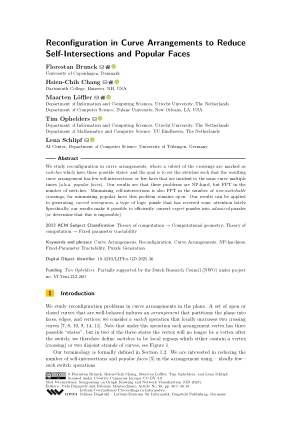Reconfiguration in Curve Arrangements to Reduce Self-Intersections and Popular Faces
Authors
Florestan Brunck  ,
Hsien-Chih Chang
,
Hsien-Chih Chang  ,
Maarten Löffler
,
Maarten Löffler  ,
Tim Ophelders
,
Tim Ophelders  ,
Lena Schlipf
,
Lena Schlipf 
-
Part of:
Volume:
33rd International Symposium on Graph Drawing and Network Visualization (GD 2025)
Part of: Series: Leibniz International Proceedings in Informatics (LIPIcs)
Part of: Conference: Graph Drawing and Network Visualization (GD) - License:
 Creative Commons Attribution 4.0 International license
Creative Commons Attribution 4.0 International license
- Publication Date: 2025-11-26
File

PDF
LIPIcs.GD.2025.36.pdf
- Filesize: 1.15 MB
- 18 pages
Document Identifiers
Subject Classification
ACM Subject Classification
- Theory of computation → Computational geometry
- Theory of computation → Fixed parameter tractability
Keywords
- Curve Arrangements
- Reconfiguration
- Curve Arrangements
- NP-hardness
- Fixed-Parameter Tractability
- Puzzle Generation
Metrics
- Access Statistics
-
Total Accesses (updated on a weekly basis)
0PDF Downloads0Metadata Views
Abstract
We study reconfiguration in curve arrangements, where a subset of the crossings are marked as switches which have three possible states, and the goal is to set the switches such that the resulting curve arrangement has few self-intersections, or few faces that are incident to the same curve multiple times (a.k.a. popular faces). Our results are that these problems are NP-hard, but FPT in the number of switches. Minimizing self-intersections is also FPT in the number of non-switchable crossings; for minimizing popular faces this problem remains open. Our results can be applied to generating curved nonograms, a type of logic puzzle that has received some attention lately. Specifically, our results make it possible to efficiently convert expert puzzles into advanced puzzles (or determine that this is impossible).
Cite As Get BibTex
Florestan Brunck, Hsien-Chih Chang, Maarten Löffler, Tim Ophelders, and Lena Schlipf. Reconfiguration in Curve Arrangements to Reduce Self-Intersections and Popular Faces. In 33rd International Symposium on Graph Drawing and Network Visualization (GD 2025). Leibniz International Proceedings in Informatics (LIPIcs), Volume 357, pp. 36:1-36:18, Schloss Dagstuhl – Leibniz-Zentrum für Informatik (2025)
https://doi.org/10.4230/LIPIcs.GD.2025.36
BibTex
@InProceedings{brunck_et_al:LIPIcs.GD.2025.36,
author = {Brunck, Florestan and Chang, Hsien-Chih and L\"{o}ffler, Maarten and Ophelders, Tim and Schlipf, Lena},
title = {{Reconfiguration in Curve Arrangements to Reduce Self-Intersections and Popular Faces}},
booktitle = {33rd International Symposium on Graph Drawing and Network Visualization (GD 2025)},
pages = {36:1--36:18},
series = {Leibniz International Proceedings in Informatics (LIPIcs)},
ISBN = {978-3-95977-403-1},
ISSN = {1868-8969},
year = {2025},
volume = {357},
editor = {Dujmovi\'{c}, Vida and Montecchiani, Fabrizio},
publisher = {Schloss Dagstuhl -- Leibniz-Zentrum f{\"u}r Informatik},
address = {Dagstuhl, Germany},
URL = {https://drops.dagstuhl.de/entities/document/10.4230/LIPIcs.GD.2025.36},
URN = {urn:nbn:de:0030-drops-250220},
doi = {10.4230/LIPIcs.GD.2025.36},
annote = {Keywords: Curve Arrangements, Reconfiguration, Curve Arrangements, NP-hardness, Fixed-Parameter Tractability, Puzzle Generation}
}
Author Details
- Department of Information and Computing Sciences, Utrecht University, The Netherlands
- Department of Computer Science, Tulane University, New Orleans, LA, USA
- Department of Information and Computing Sciences, Utrecht University, The Netherlands
- Department of Mathematics and Computer Science, TU Eindhoven, The Netherlands
Funding
- Ophelders, Tim: Partially supported by the Dutch Research Council (NWO) under project no. VI.Veni.212.260.
References
- Kees Batenburg and Walter Kosters. On the difficulty of nonograms. ICGA journal, 35:195-205, December 2012. URL: https://doi.org/10.3233/ICG-2012-35402.
- David Callan. A combinatorial survey of identities for the double factorial. https://arxiv.org/abs/0906.1317, 2009.
- Yen-Chi Chen and Shun-Shii Lin. A fast nonogram solver that won the TAAI 2017 and ICGA 2018 tournaments. ICGA Journal, 41(1):2-14, 2019. URL: https://doi.org/10.3233/ICG-190097.
- Phoebe de Nooijer. Resolving popular faces in curve arrangements. Master’s thesis, Utrecht University, 2022. URL: https://studenttheses.uu.nl/handle/20.500.12932/494.
-
Phoebe de Nooijer, Soeren Nickel, Alexandra Weinberger, Zuzana Masárová, Tamara Mchedlidze, Maarten Löffler, and Günter Rote. Removing popular faces in curve arrangements. In Proc. 31st International Symposium on Graph Drawing, 2023.

- Phoebe de Nooijer, Soeren Terziadis, Alexandra Weinberger, Zuzana Masárová, Tamara Mchedlidze, Maarten Löffler, and Günter Rote. Removing popular faces in curve arrangements. Journal of Graph Algorithms and Applications, 28(2):47-82, November 2024. URL: https://doi.org/10.7155/jgaa.v28i2.2988.
-
Cole A. Giller. A family of links and the Conway calculus. Transactions of the American Mathematical Society, 270(1):75-109, 1982.

-
Jim Hoste. The Arf invariant of a totally proper link. Topology and its Applications, 18(2–3):163-177, 1984.

-
Vaughan F. R. Jones. On knot invariants related to some statistical mechanical models. Pacific journal of mathematics, 137(2):311-334, 1989.

-
Louis H. Kauffman. State models and the Jones polynomial. Topology, 26(3):395-407, 1987.

-
Louis H. Kauffman. Gauss codes, quantum groups and ribbon Hopf algebras. Reviews in Mathematical Physics, 5(4):735-773, 1993.

-
Maarten Löffler, Günter Rote, Soeren Terziadis, and Alexandra Weinberger. On solving simple curved nonograms. In Proc. 36th International Workshop on Combinatorial Algorithms (IWOCA 2025), 2025.

- Neil Robertson and Paul D. Seymour. Disjoint paths—a survey. SIAM Journal on Algebraic Discrete Methods, 6(2):300-305, 1985. URL: https://doi.org/10.1137/0606030.
- Alexander Schrijver. On the uniqueness of kernels. Journal of Combinatorial Theory, Series B, 55(1):146-160, May 1992. URL: https://doi.org/10.1016/0095-8956(92)90038-Y.
- Nobuhisa Ueda and Tadaaki Nagao. NP-completeness results for NONOGRAM via parsimonious reductions. Technical Report TR96-0008, Department of Computer Science, Tokyo Institute of Technology, 1996. CiteSeerX 10.1.1.57.5277, URL: http://citeseerx.ist.psu.edu/viewdoc/summary?doi=10.1.1.57.5277.
- Mees van de Kerkhof, Tim de Jong, Raphael Parment, Maarten Löffler, Amir Vaxman, and Marc J. van Kreveld. Design and automated generation of Japanese picture puzzles. Comput. Graph. Forum, 38(2):343-353, 2019. URL: https://doi.org/10.1111/cgf.13642.
-
Jan van Rijn. Playing games: The complexity of Klondike, Mahjong, nonograms and animal chess. Master’s thesis, Leiden Institute of Advanced Computer Science, Leiden University, 2012.

